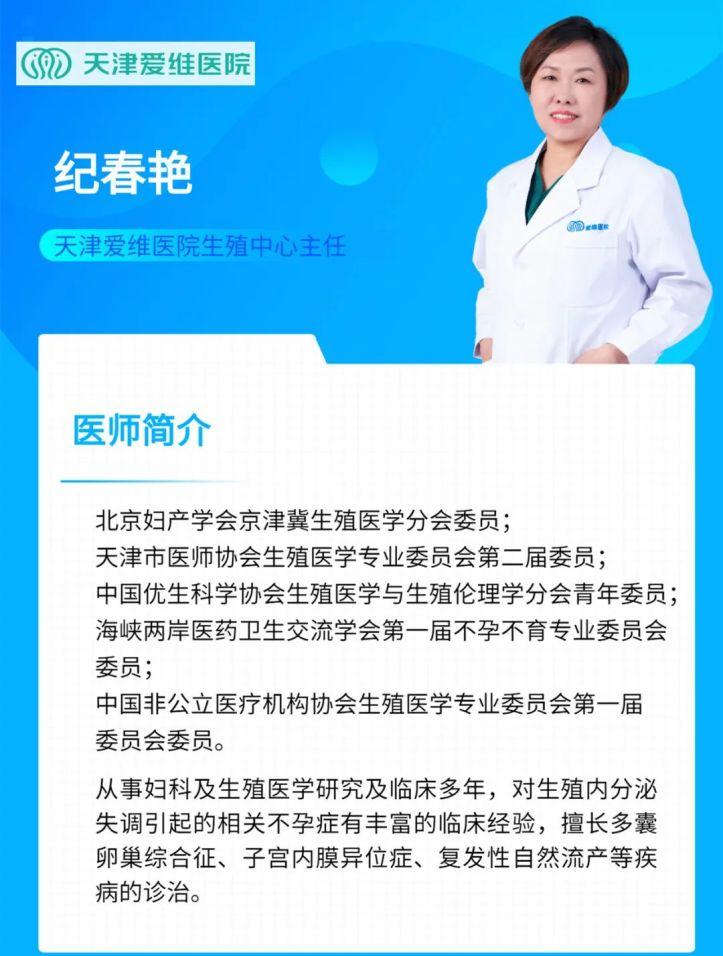Expert Q&A
GUEST
Director Ji Chunyan

Embryo transfer is an important part of the IVF treatment cycle, and whether the embryo can implant smoothly is the key to the success or failure of IVF. So, what are the precautions after embryo transfer? Today, we specially invited Ji Chunyan, director of the Fertility Center of Tianjin Avi Hospital, to answer questions for everyone after transplantation.
expert
interlocution
Q: After the transfer, will the embryo fall out when walking or going up and down the stairs?
A: Of course not, after the transplant, there may be a little fluid and secretion in the vagina, which is a normal phenomenon. Embryos are small, have little gravity, and the embryos stick to the lining of the uterus and don't fall out. It is recommended that after the transplantation, you can carry out a normal life, avoid overwork, and do not stay in bed for a long time, so as not to cause pelvic congestion, which is not conducive to embryo implantation, and in severe cases, it may form blood clots.
Q: Can I take the bus home after the transplant?
A: If there is no special discomfort after transplantation, you can go home on the same day, train, car, the road is not particularly bumpy. You can put a cotton pad or throw pillow on the saddle, which will reduce shocks, improve comfort, reduce fatigue, pay attention to keep warm, and most importantly pay attention to driving safety.
Q: Can I take medication if I have a cold before and after embryo transfer?
A: Fertility doctors are often asked about medication before and after transplantation, such as a mild cold or cold, it is recommended to drink more warm water to ensure rest, most of which can be relieved. If fever, pharyngitis, severe cough, or even bronchitis or pneumonia occur, it is recommended to go to a respiratory medicine department and use drugs rationally.
Q: Will I experience constipation after embryo transfer?
A: Because IVF babies need to use progesterone fetal protection drugs after transplantation, coupled with the fact that most patients have reduced activity, and the diet is more delicate, the comprehensive effect reduces intestinal peristalsis, and sometimes constipation does occur. If symptoms are mild, it is recommended that they can be corrected by adjusting the diet structure, such as eating more fresh vegetables, fruits, high-fiber foods, moderate exercise, and avoiding excessive bed rest. If symptoms are severe, it is recommended to go to a gastroenterologist.
Q: What happens to the brown discharge after transplantation?
A: A small number of patients will have brown discharge after transplantation, which may be needle-eye bleeding during egg retrieval or cervical bleeding during transplantation, which is generally not much bleeding, no need to worry, no intervention; There are also people who have a small amount of bleeding 5-7 days after transplantation, which may be a manifestation of bleeding after implantation, and contact a doctor in time.
Q: I don't feel like I'm pregnant after transplantation, am I not pregnant?
A: After IVF embryo transfer, most people do not feel anything when the embryo implants, but many people will have a small amount of bleeding (also known as implantation bleeding), and some people may have mild abdominal pain or low back pain. Therefore, it is impossible to determine whether to be pregnant from the symptoms or feelings. Pregnancy is ultimately determined by the blood hCG value 14 days after embryo transfer.
SUMMARY
Dialogue · brief summary
Dialogue Moment
Ivy after ivy transplantation feels different from person to person, physiological phenomena are very complex, although there are some common laws, but the individual differences are very large, such as the same day transplant patients, you can feel the changes, in another person may not feel at all. Therefore, do not be overly nervous if there is a problem after transplantation, and follow the doctor's advice and consult at any time.